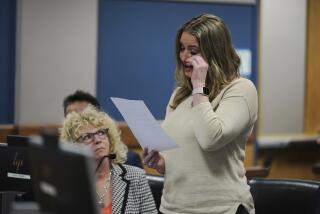Advised Lying : Lawyer Gets 6 Months for Conspiracy
- Share via
A Tarzana lawyer was sentenced to six months in prison and 600 hours of community service Monday for obstructing justice in an investigation of a Woodland Hills businessman convicted of master-minding a multimillion-dollar white-collar crime ring.
Chester Brown, 48, was convicted May 28 by a U.S. District Court jury of conspiracy and obstruction of justice for his part in advising witnesses to lie to a federal grand jury to conceal the role of the scheme’s kingpin, George Scordel, 54.
Scordel was sentenced in May to 20 years in federal prison for running a scheme that used credit manipulation and planned bankruptcies to cheat merchants out of more than $8 million. He was convicted of 45 counts of conspiracy, mail and wire fraud, interstate transportation of stolen goods, obstruction of justice and perjury.
Ethics Class Lectures
Brown was sentenced by U.S. District Judge Terry J. Hatter Jr., who ordered the lawyer to spend some of his community service hours lecturing in law schools and speaking to ethics classes.
In a letter to the court and in statements outside of court, Brown said he had been using cocaine the day he met with Scordel and potential witnesses and advised them to invoke their constitutional right against self-incrimination. He said the drug clouded his judgment.
“I don’t offer the use of drugs as an excuse, but at least it’s an explanation,” Hatter said of Brown’s statement.
Brown’s attorney, Michael Kenney, accused the government of targeting Brown, who was an assistant U.S. attorney from 1971 to 1975.
“I have to believe, too, that perhaps the government went after you the way they did because they were concerned that you had been one of theirs who had gone wrong,” Hatter said. Assistant U.S. Atty. Thomas Hagemann characterized Brown as “the criminal defense expert,” in the bankruptcy scheme.
“His actions, his words and his attitude toward the truth really set the tone for the whole thing,” Hagemann said.
But Brown said he did not realize he was committing a crime when he advised witnesses with legal problems to “take the Fifth until they figured out what to do.” A tape recording of Brown encouraging witnesses to invoke their right against self-incrimination was introduced as evidence in Brown’s trial.
“I’ve been embarrassed and ashamed of a lot of the comments I made on that tape,” Brown told the court. “I think I let everybody down by allowing this to happen.”
More to Read
Sign up for Essential California
The most important California stories and recommendations in your inbox every morning.
You may occasionally receive promotional content from the Los Angeles Times.










